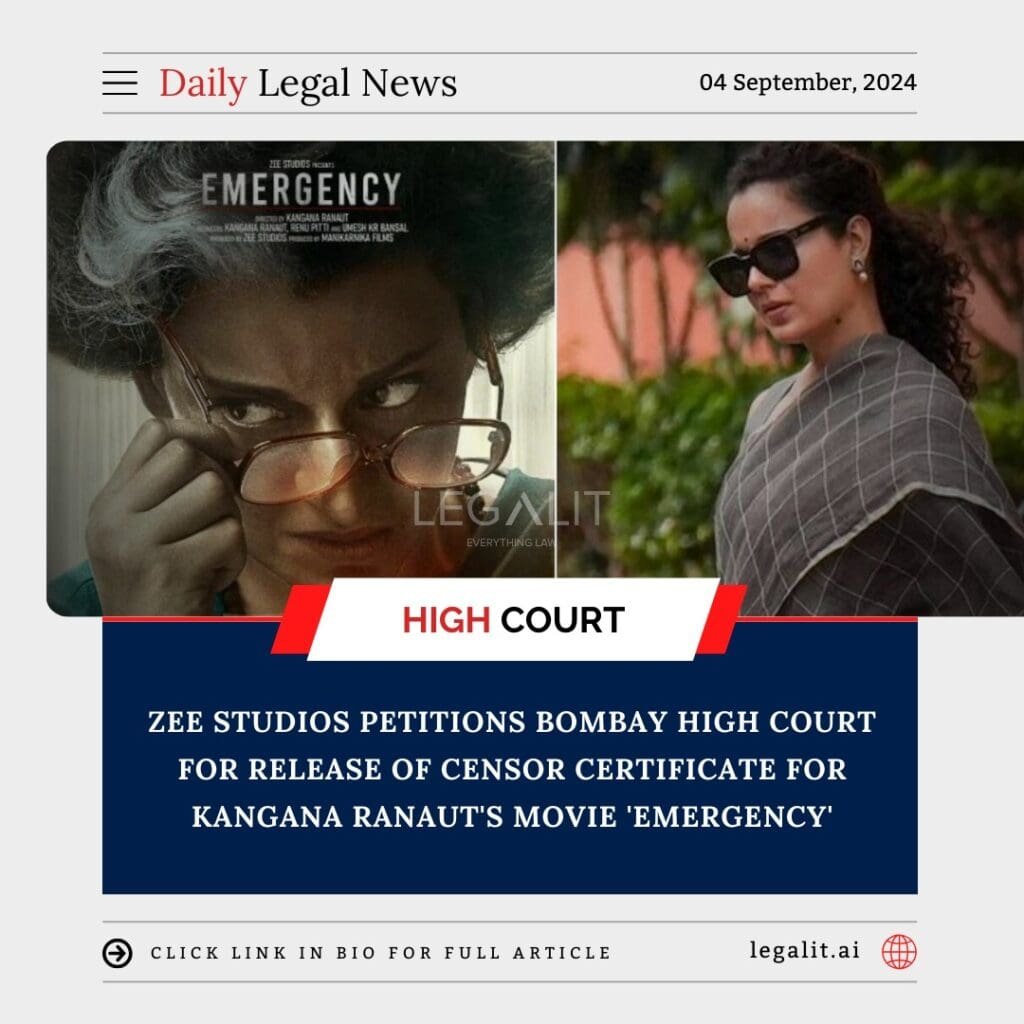
Zee Studios has approached the Bombay High Court seeking the release of the censor certificate for the upcoming movie ‘Emergency,’ directed by and starring Kangana Ranaut. The film, which delves into one of India’s most contentious periods, the Emergency declared in 1975, has been eagerly anticipated. The studio’s petition comes after delays in obtaining the necessary certification from the Central Board of Film Certification (CBFC), which is required for the film’s release.
Background of the Case:
‘Emergency’ is a historical drama centered around the period when Prime Minister Indira Gandhi declared a state of Emergency in India, from 1975 to 1977. The film portrays key political events, decisions, and repercussions of that era, offering a dramatized account of one of the most controversial times in Indian political history. As it deals with sensitive political content, the CBFC’s scrutiny process has become a focal point for its release.
Key Points of the Petition:
- Delay in Issuance of Censor Certificate: Zee Studios has filed a petition in the Bombay High Court citing undue delays by the CBFC in issuing the censor certificate. According to the petition, the studio had submitted the film for certification well in advance but has not received a response within the stipulated time frame, affecting their planned release schedule.
- Request for Expedited Process: The petition seeks an urgent directive from the court to the CBFC for the issuance of the censor certificate, enabling the movie to be released as per its promotional timelines. The studio argues that further delays could cause significant financial losses and impact their marketing strategy.
- Alleged Administrative Delays: Zee Studios contends that the delay in obtaining certification is purely administrative and not based on any substantive content issues. The studio asserts that all guidelines and norms for certification have been adhered to, and hence, there is no valid reason for the hold-up.
- Freedom of Expression and Artistic Liberty: The petition emphasizes the importance of upholding freedom of expression and artistic liberty, particularly when dealing with historical and political subjects. It argues that the CBFC should act in a timely and transparent manner to ensure that filmmakers are not unjustly impeded.
Legal Context and CBFC’s Role:
- CBFC’s Certification Process: The CBFC is responsible for certifying films in India, ensuring that they adhere to the guidelines outlined in the Cinematograph Act, 1952. The process involves reviewing the film’s content to determine its suitability for public viewing, which includes assessing potential issues related to obscenity, violence, communal harmony, and national security.
- Previous Cases and Precedents: There have been numerous instances where film producers have approached the courts seeking intervention due to delays or disputes with the CBFC. The judiciary has often balanced the need for regulatory oversight with the protection of creative freedom.
Broader Implications of the Case:
- Impact on Filmmakers and Studios: The outcome of this petition could set a precedent for other filmmakers who face similar delays. If the court directs the CBFC to expedite its certification process, it could encourage more transparency and accountability in how films are reviewed and certified.
- Freedom of Speech vs. Regulatory Oversight: This case brings to light the ongoing debate between maintaining regulatory oversight of film content and protecting the freedom of speech and expression. It underscores the need for a balanced approach that allows creative works to flourish without unnecessary delays or censorship.
- Potential Changes to CBFC Processes: If the court rules in favor of Zee Studios, it could prompt a reevaluation of the CBFC’s processes to ensure timely and efficient certification. This might include clearer timelines, streamlined procedures, and better communication with filmmakers.
Next Steps:
The Bombay High Court is expected to hear the petition filed by Zee Studios soon. The court may seek responses from the CBFC regarding the reasons for the delay in issuing the censor certificate for ‘Emergency.’ Depending on the court’s observations, a decision may be made to expedite the certification process or provide a specific timeline for completion.
Conclusion:
Zee Studios’ move to petition the Bombay High Court reflects the challenges filmmakers often face in obtaining timely certification for their projects, especially those dealing with politically sensitive subjects. As the court examines the matter, the decision could have significant implications for the future of film certification in India, potentially paving the way for a more transparent and efficient process.